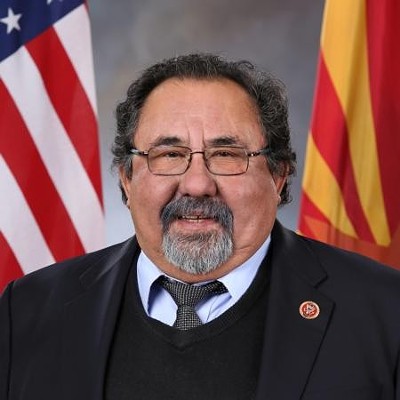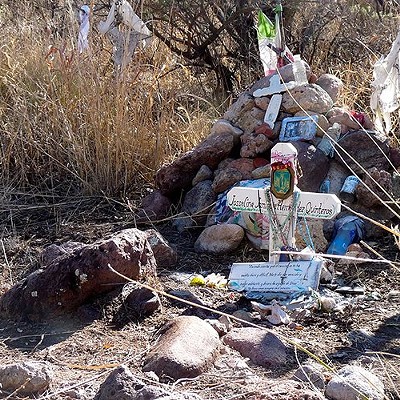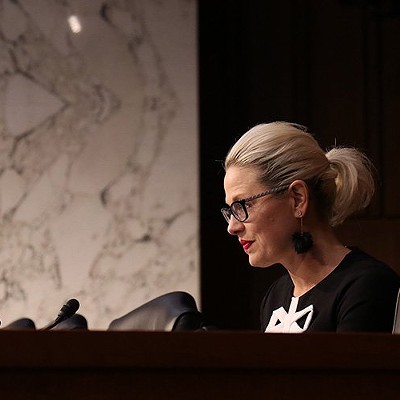But in recent months, this otherwise mundane setting has become the reluctant backdrop for cantankerous drama. Such was the case on the warm afternoon of New Year's Eve, when immigrant activists gathered outside the building to complain loudly about the treatment of a pregnant Mexican woman stopped by TPD officers on Dec. 9.
The family of Miriam Aviles de Reyes was pulled over on Miracle Mile, purportedly after police ran a random check on their truck and discovered that it had no insurance.
Further complicating matters, Reyes and her husband speak little English. According to the activists, that prompted the officer to ask about their citizenship status and ultimately call the U.S. Border Patrol.
The police say this process took about an hour. But Reyes says she was held beside the road for nearly three hours--during which time she went into labor. She also alleges that the officer tried to shove her into the Border Patrol van, causing her to fall.
Regardless, as a result of that stop, she was to be deported with her infant on New Year's Eve. Her husband, a seven-year resident of the United States, had already been returned to Mexico.
At the heart of this case are questions of racial profiling--why the family was stopped in the first place--and whether it's ever appropriate for city police to participate in noncriminal deportations.
Critics of the police actions include Isabel Garcia, co-chair of the Derechos Humanos immigrant-rights group, and an organizer of the Dec. 31 press conference. "TPD called the Border Patrol immediately" after stopping Reyes, Garcia told reporters. The officer "looked in the truck and said, 'Do you guys have papers?' It was his second question.
"TPD claims they have a policy that doesn't permit them to enforce immigration laws, but that's a lie," she said. "It's a policy that's so permissive and vague and ambiguous that they can do whatever they want."
Reyes then described abusive behavior by the police officer. Even as she started going into labor, "He told me I was being dramatic," she said. "Then I told him, 'Stop, don't push me.' He tried to push me into the van, and that's when I fell."
Even as Reyes was speaking to the crowd, several uniformed officers watched from the side, arms crossed. Then Sgt. Fabian Pacheco, wearing a suit and tie, interrupted to say the TPD would soon give its own version of the events.
Later, inside the headquarters, Pacheco described "a lot of inaccuracies" provided by Garcia's group "just to stir up the issue--just to get publicity for their cause."
Pacheco says there was more than a simple language problem behind his officer's actions on Dec. 9. "This isn't something where we just decided to call Border Patrol because we couldn't communicate. Just because (Reyes' husband) doesn't speak English or because he's a Spanish speaker, that may be a factor, but it's not the only factor."
Still, these competing press conferences only underline TPD's growing touchiness regarding its handling of immigrants. This trend spiked in November, when police responded to a call from Catalina High Magnet School. Marijuana had been found in a student's backpack, and officers suspected that the teen was undocumented. Border Patrol was called, and the entire family deported.
The incident sparked a big walkout by students who marched on TPD headquarters. The department soon announced that it would no longer summon immigration officers to schools or churches--a policy shift that drew another set of indignant citizens a few days later. This time, protesters were angry that officers would no longer take such forceful steps against undocumented immigrants.
Assistant Chief Roberto Villaseñor then stepped out to address the anti-immigrant throng, gathered at the urging of a right-wing radio station. "Our main mission is not enforcement of immigration laws; our main mission is public safety," he told the crowd. "There are federal agencies that are tasked with that."
Indeed, that position seems entrenched in department policy, which states that officers can't stop someone just because they appear to be in the country illegally. Still, there's a lot of wiggle room between an officer's experienced hunch and blatant racial profiling.
Some law-enforcement officials, such as Maricopa County Sheriff Joe Arpaio, actually embrace the role, garnering loads of publicity by aggressively going after undocumented immigrants.
But that approach can backfire. One of the most notorious examples occurred in the Phoenix suburb of Chandler in 1997, when 35 police officers joined five Border Patrol agents in a sweep of low-income neighborhoods. Ultimately, they rounded up 432 illegal immigrants--and faced a firestorm of criticism and lawsuits over racial profiling.
Sometimes, though, even hard lessons don't stick: Just this month, Pima County Sheriff Clarence Dupnik announced his desire to deputize Border Patrol agents, so that his department could have access to more investigative information.
Such intermingling disturbs Lynn Tramonte, deputy director for legislative affairs with the National Immigration Forum in Washington, D.C. "It is a growing trend, because right after Sept. 11, the (U.S.) Justice Department tried to create new policies to get police to do immigration enforcement," she says. "There was a lot of local press about that, and a lot of local police felt that they were now required to help in immigration enforcement.
"Whereas before, they had really focused on people who committed crimes," she says, "after Sept. 11, they began looking at just about anybody they came across."
That obviously includes immigrants. But local police have a different role than federal agents, who are trained in immigration law, she says. "And if they have a reasonable suspicion that someone is undocumented, (federal agents) can make inquiries into a person's status. But state and local police officers cannot. They can't use racial cues or linguistic cues to decide who they question about immigration status."
Either way, the price tag may be too high. "If the police are helping the federal government deport people who are convicted of crimes, then that makes a lot of sense," she says. "That's what they've been doing for a long time.
"But if you're talking about police just helping to deport somebody who's an undocumented worker but hasn't committed a crime, not only is that a bad use of local law-enforcement resources, but it's going to set back their ability to win the trust of the community and encourage other immigrants to report crimes."












